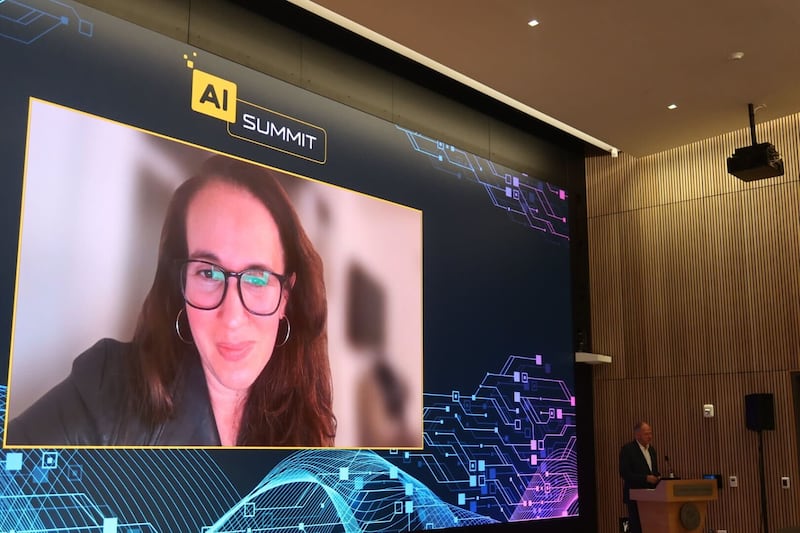The USC AI Summit brought hundreds of Trojans to the Ginsburg Hall Auditorium on Tuesday. At the summit, Marshall School of Business Dean Geoffrey Garrett announced a partnership between USC and OpenAI that provides all USC students, faculty and staff with complete access to GPT-5 and limited access to more advanced AI models from OpenAI.
Garrett said, “Behind the scenes, we were desperately hoping that USC and OpenAI could come to an institutional level agreement about the use of AI on campus, and we did that.”
To open the event, USC Interim President Beong-Soo Kim and guest Eric Schmidt, former CEO of Google, had a conversation about the future of AI.
Schmidt joked with the crowd, saying it took him one sentence to write a sonnet about the Marshall School of Business. He poetically urged, “USC with boldness lead the way and teach tomorrow’s mind what rules today.”
After the applause died down, Schmidt said, “Welcome to the new world of AI.”
When President Kim asked Schmidt if AI would enhance or disrupt the university model as we know it, Schmidt replied that universities will adapt due to the innovation of students.
“This is like the arrival of electricity, maybe even more so,” said Schmidt when discussing the importance of getting students ready for the outcomes of AI. In terms of AI in universities, Schmidt said he trusts faculty can figure out who cheated from a grading perspective.
What worries him is the potential for a decline in critical thinking due to a decline in reading. “The answer to the addiction cycle, because these are all fundamentally addiction devices, is to train your students to turn them off for a while,” said Schmidt, urging students in academia to put down their phones and get in the zone.
President Kim called attention to the worries students have about how AI could impact the future, from the hard sciences to the performing arts. To that, Schmidt said the rise of AI will lead to more jobs that differ from those of today. He pointed out the productivity increase that comes from AI and urged students to get excited about and figure out ways to participate in the agentic revolution, the shift where AI goes from being a passive tool to a proactive one needing minimal human oversight.
“What we wanted to do with the summit is celebrate the best of USC,” said Garrett. There were eight presentations on a wide range of topics, from AI to alleviate homelessness to AI in the film industry.
Garrett called the presenters the “depth and breadth of the university” because the topics ranged everywhere from the humanities to the health sciences. Students, faculty and staff presented on the importance of AI literacy, AI-driven policies to help people experiencing homelessness and even showed a film created by AI.

After the speakers wrapped up, Garrett came back to the stage one last time and Leah Belsky, the head of education at OpenAI, appeared on the big screen, where she addressed the professors who are worried about AI.
“I am conscious that AI has made the life of a professor very difficult,” Belsky said. “At the same time, what a lot of the research shows is when AI is deployed in specific ways, guided by the professor, that is when students learn.” She said she understands the process can be painful and scary, but hopes that over the coming years, professors will reimagine assignments and figure out components of the class that can be enhanced by AI, enabling students to think deeper than they otherwise would with traditional methods.
Garrett addressed privacy and data security concerns by stating that every user’s privacy will be protected with data governance strategies. “USC data will remain protected at all times,” said Garrett. “OpenAI will not use our data in model training.”
Garrett sent out an email on Wednesday afternoon announcing the collaboration between OpenAI and USC and directed students, faculty and staff to the new AI at USC website for updates and resources.
